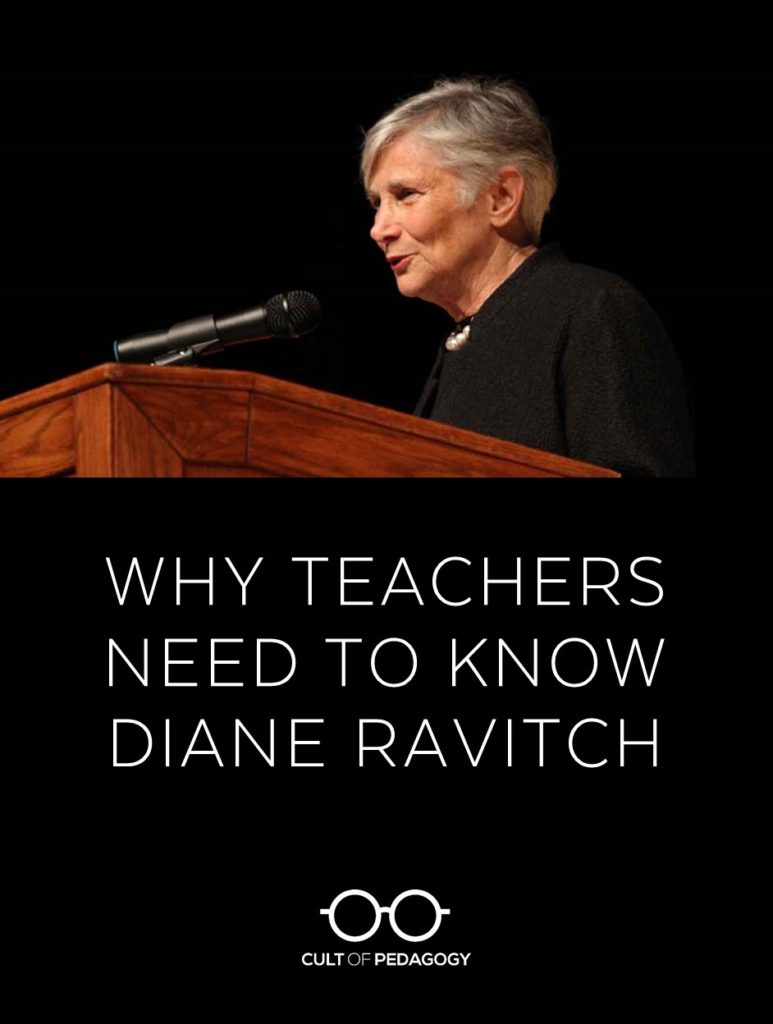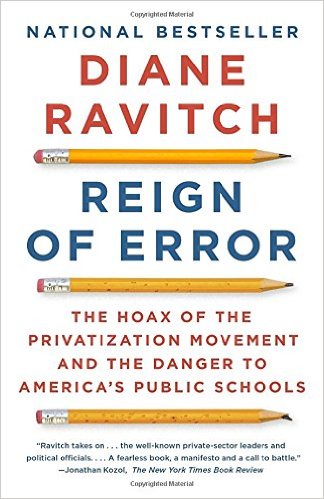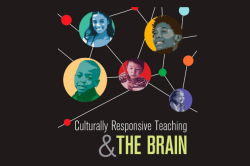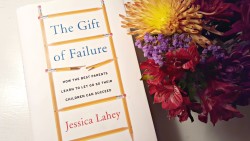
Some links in this post are Amazon Affiliate links, which means we receive a small commission on any purchase you make during that visit at no extra cost to you.
For some, the notion that there are still people who don’t know the name Diane Ravitch is absurd. But I can only use my own experience as a guide, and three months ago, I had never heard of her. A friend of mine posted a video on Facebook that was slamming the Common Core, and it caught me off guard. I had worked with the Common Core standards for several years already, I liked them, and I was completely unaware that they had become so controversial.
Once I started researching, it didn’t take long for me to find Diane Ravitch, and that was the day my education on policy issues really began. A historian, professor, and former U.S. assistant secretary of education, Ravitch has devoted all of her energy in recent years to documenting the changes in American public schools. Her most recent book outlines the whole arc of the reform movement, starting with the publication of A Nation at Risk in 1983, through No Child Left Behind, all the way to Obama’s Race to the Top. In Reign of Error: The Hoax of the Privatization Movement and the Danger to America’s Public Schools, she names every significant player in this decades-long drama and explains each one’s connection, with direct quotes and references to their most significant moves. And she uses data to measure the success of every major reform in the past 20 years, demonstrating exactly why most of them have been really bad ideas.
If you’re anything like me, you shy away from talk of politics, current events, or any kind of legislative issues for two reasons: fear of sounding ignorant, and fear of being attacked. To learn enough for full, confident participation seems impossible. And practicing classroom teachers, who have the most up-to-date, relevant experiences with how policy plays out, and who will be among those most impacted by educational policy, are least able to participate in the discussion. Most teachers just don’t have the time to keep up.
This is why I’m recommending Reign of Error to teachers. It’s not a quick read, but even if you just cover a page or two a day, you’ll likely find yourself understanding things you never quite had a handle on. And the next time talk of policy comes up, you’ll find that you can participate better. Although lots of teachers are already out there, debating these issues, more informed voices are needed.
Besides reading Reign of Error, make it a habit to check Ravitch’s blog on a regular basis. She keeps it updated with breathtaking frequency: Today, she has already posted seven times. Yesterday, twelve times. Most of her posts provide by-the minute updates on things that are happening in every state – small victories by groups organizing against standardized testing or pro-charter laws, links to op-ed pieces and blog posts that weigh in on reform issues, and laws and lawsuits that are popping up all over the country from opposing sides on every educational policy issue that matters. If you ever want an update on the most important thing happening in education right now, go to her blog and it will be there.
Although I have some concerns about the movement that has grown around Ravitch, which I’ll get to in a moment, I would say without reservation that no teacher can claim to be a fully informed professional if they do not have Diane Ravitch on their radar.
The Short Version
Because you all are busy, and because this information is too important to wait, I’m going to try to give you the abridged version of Reign of Error. Nothing can replace actually reading the book, but here’s the basic gist:
Over the past several decades, a message has been sent to the American people that our public schools are failing. Most of this idea is based on how our students perform on certain standardized tests. By studying those scores more closely, Ravitch shows that those who interpret them have made some pretty big leaps to perpetuate the failure myth. Although a portion of our students — mostly low-income — are struggling, many more are doing just fine.
Nonetheless, the myth of failing public schools prevailed to such a degree that it spawned No Child Left Behind, which threatened to close schools that did not move 100 percent of its students to proficiency on standardized tests, a goal that Ravitch shows is basically impossible. As more schools faced government closure, charter schools moved into communities with the promise of saving their children and offering families “choice.”
Understanding the concept of a charter school, and how it has changed over time, is the most important thing I got from reading this book. Originally, the charter school concept looked like this: Small groups of public school teachers who wanted to try new strategies in order to reach struggling students would be permitted to start their own public schools for a defined period of time, sharing what they learned with their original school. What ultimately happened was quite different: For-profit companies produced chains of charter schools that operated under a profit-driven model, which meant hiring the least expensive teachers, not requiring teaching credentials, and making the bottom line, not students, their top priority. They are run mostly from outside the communities they serve, and their profits go there, too. For each child they teach, they receive public money, which effectively drains funds from the local public schools and makes them more likely to perform poorly, and yet, with key laws put into place, most charters are exempt from any public oversight. Public money without any public rules. Sounds fishy, doesn’t it?
In a few cases, charters have succeeded, but Ravitch shows that most perform the same as — or worse than — the public schools they replaced. For some government officials, who often have financial ties to the same corporations that fund the charters, this lack of results doesn’t matter. Armed with the failing public schools myth, they press on, closing public schools and funneling millions of tax dollars to private companies that haven’t proven their worth.
While the reform movement has targeted teachers as the source of student failure, it has completely sidestepped the issue of poverty, which has a much stronger correlation with poor school performance. In the second half of the book, Ravitch details what she thinks should be happening instead of privatization: more investment in public schools, better services for low-income families, a broader and richer curriculum, and testing that only serves to help teachers diagnose the needs of their students. Her vision is more complex and costly than our current model, but it is one that values community, the expertise of well-trained teachers, and the responsibility we all share to educate our children.
Once you read Reign of Error, you’ll have a much better understanding of how things got the way they are, why you’re spending so much time on test prep, and why your job has gotten so much harder over the last few years. And once you see the whole picture more clearly, you’ll be better able to participate in the push toward something different.
Concerns
Along with my strong recommendation for Reign of Error, I do have a few concerns about the movement surrounding Ravitch that I think are worth mentioning.
First, the tone of the debate can get really nasty. Just follow any of the links from Ravitch’s blog to other articles and you’ll find yourself in a sea of sarcasm, low blows, and personal attacks. This makes participating in the conversation a scary prospect. Anyone who expresses an opinion that deviates at all from the general consensus is mocked, called a sell-out, or hung out for public humiliation. Ravitch herself isn’t the one doing this; it’s others in the community that has developed around her, especially down in the comments section of her blog and those of others in the same movement. Right now, I’m actually kind of scared to post this because I’m expressing some concerns. The kind of vitriol that I’ve seen surrounding this issue is understandable to some extent, because we’re talking about pretty serious stuff, but I don’t think it’s healthy, because it marginalizes anyone who doesn’t follow what can sometimes feel like a party line. And that ultimately limits the richness of the conversation and its potential to educate those who arrive late, armed with all of our “stupid questions.”
Another concern is the fact that somehow, the far right is starting to move into the same territory as those who follow Ravitch. I’m sure this was never her intention, but my first entry into her world came from an anti-Common Core video which was being publicized by none other than Glenn Beck. A different kind of anti-Common Core movement is stirring, except this one opposes it for its “socialist” undertones. This group is most definitely not pro-public schools, and the fact that the distinction between this group and Ravitch may get blurred is, in my opinion, not a good thing.
A third concern is that the “us” vs. “them” mentality of the movement could put a real damper on innovation and problem-solving. Once an organization or a person gets blacklisted as part of the privatization movement, anything they touch is tainted. This makes it hard for a teacher to navigate all the new resources that appear every day. Just last month I reviewed PlayPosit, a free and really useful online tool that was developed by a former Teach for America teacher. Once I started reading Reign of Error and Ravitch’s blog, I learned that Teach for America has been identified as being kind of part of the problem – on the naughty list, so to speak, and I thought, crap. Now anyone who sees that review is going to think I’m on someone’s payroll. In October, I urged readers to go to Teaching Channel – turns out that’s funded by the Gates Foundation, another member of the “other” side. I wondered if, by promoting the channel, I was already picking teams. We can’t do that – start viewing every great idea or innovative product with suspicion, wondering who is behind it and whether we “should” like it. And the creative people whose ideas end up getting scooped up by the wrong side shouldn’t be punished, either, because my guess is, they know about as much as I did three months ago.
My final concern is my biggest, and it’s the one I will probably take the most heat for: I think teacher quality is getting shoved aside in all this, and because the reform movement has wrongly demonized teachers, then anyone who suggests that some teachers do, in fact, need improvement are lumped in with the reformers. I have worked with some exceptional teachers, but I have also experienced poor teachers from nearly every angle: as a student, I had some teachers who had no business being in the classroom. As a teacher in two different states, I worked alongside some who fit that same description, and at times their negativity nearly crushed me. As a teacher educator, I stood by as my institution gave diplomas to a few people I thought were overwhelmingly unqualified to teach. And as a parent, I’ve seen how differently my own kids experience school from year to year, depending on who is leading their classroom. Less than four pages of Reign of Error really focus on strengthening the teaching profession. I believe Ravitch when she says that teacher quality matters, but much of the conversation that surrounds her seems built on the assumption that every teacher in every classroom is excellent, and that’s just not true. Granted, we have bigger fish to fry at the moment; I just hope that once the tide against privatization gains more momentum, we can get back to improving the work of teachers.
A Worthy Investment
Even if you never get around to reading all of Reign of Error, invest in it anyway. For one reason, you’ll have at your disposal a great reference tool for understanding education policy and history. If you come across a news story about Chiefs for Change, you can look them up in this book and get some idea of their history. If you want to know who Michelle Rhee is and why so many people are so angry at her, look it up in Reign of Error.
You’ll also be making an investment in Ravitch herself, and I would say that’s money well spent. Few people have her background knowledge, her experience, her singular focus, and holy crap, her persistence to so carefully document and disseminate this knowledge, seemingly at all hours of the day. I want her to keep going, because in the end, I trust that she absolutely has our best interests in mind. ♦
Join my mailing list and get weekly tips, tools, and inspiration all geared toward making your teaching more effective and fun. You’ll also get access to my members-only library of free resources, including my e-booklet, 20 Ways to Cut Your Grading Time in Half, which has helped thousands of teachers spend less time grading!






As you suggest, there are not just 2 sides. Thanks for recognizing that. For what it’s worth, our 3 kids all attended urban public schools and I was an urban public school teacher for a number of years.
Also, have worked with charter schools since the first law was adopted, I can tell you that the vast majority of charters are not run by for-profit companies.
We work with both district & charter schools. for more info, see http://www.centerforschoolchange.org And thanks for seeing that there are more than 2 sides.
Jennifer,
Nice to find your blog as it was referenced in Diane Ravitch’s blog. I hope that you will indeed feel comfortable enough to come join the conversations. And, yes, at times they get a bit contentious but at the same time for the most part quite civil. And posters do “jump on” others-just ask Joe Nathan as he is often “attacked”, a bit unfairly in my mind, but he his strong enough to deflect the attacks and state his positions, some with which I don’t agree.
Now, I am one that can be sarcastic, caustic, biting etc. . . , hopefully not malicious in some of my comments but that is because sometimes it seems necessary to wake/jar people out of their stupor and complicity in the myriad educational malpractices which are foisted upon us by those who have never or barely taught.
Have your voice amplified by coming over and commenting on the issues that Diane raises on a daily basis.
Thanks, Duane. I’m working on a comment there now.
I too am thankful for discovering your blog via Ravitch’s Blog.
Your review was relevant and spot on in a number of ways. I recalled turning my sister (an English teacher) on to Diane Ravitch and The Reign of Error. She was mostly relieved to find a spokesperson and voice for what she believed for so long to be threatening public education.
Yes, I agree, there are teachers who are not as effective as others. There are those that truly do not belong in the classroom, but as you said, we have larger fish to fry. The mere fact the message has been narrowed to those teachers you speak of (and for that matter, all teachers) bearing the lion’s share of the blame for the faults and failures of the education system, is however central to the bitterness that is reflected in some of the comments on the Ravitch blog. The “yes, but there are bad teachers,” reminds me of folks thinking all government safety nets should be abolished after witnessing someone “who, obviously didn’t need food stamps,” buy lobster with their EBT card.
I do think that there are deep and intricate nuances to the argument, but I believe the current climate leaves little room for compromise, as teachers and former teachers are not consulted on the policies that are flowing from the top down, whether they be, federal, corporate, state or district levels. And Diane Ravitch is vilified by so many of the powers that be, as well. Unfortunately, it is in as much a reflection of the current divided political landscape of this country.
The great principal I spoke of in my last blog, went on to start a successful charter school and sit on the board of the district Charters organization. I urged and helped several students to apply for certain charters that I thought would make the best option for them, (even though there wasn’t a great chance they would win the lottery). Many charters were the best options, because the reality of many of our public schools was that firing all those teachers didn’t greatly change the quality.
I also appreciate your comment on the “other” anti-common-core, as I was perplexed by an ad in the local paper for a John Birch Chapter hosting a viewing of a film dictating the dangers of the Common Core. You have explained this further. I too welcomed common core in its initial presentation. It was most certainly a better alternative to the mile-wide and an inch-deep curriculum preceding it. You are not alone, on that point either.
I have walked and teetered right off the fine line of impartiality by delving into the Ravitch camp. I venture to say the comments that are disconcerting are what passion trampled, sounds like. I write my blog to get attention and ultimately volunteers to come to Peru to help out, but like so many teachers who have given their heart and soul to the profession, I felt the need to speak out on my most recent stateside teaching experience. I worry about taking a stance, but I worry more about not taking a stance. Hence, I decided taking a stand on how I feel about the current education climate is warranted.
This is all to say, that I am happy to build on my variety of opinions and educational thought with the discovery of your blog with the longest of comments I have ever made.
Hi. So glad you joined us here. “Passion trampled”…nicely put. Thanks for your thoughtful comment here and for joining the site — I have spent quite a while looking at your organization’s website, http://teachateacher.org, and I’m fascinated by the work you do. I would definitely like to learn more.
Thank you, Jennifer, for not chastising my long winded reply. I shared your blog as a resource on our FB page. If you are interested in teaching any one of your valued skills to teachers in Peru, you are welcome to come. I apologize that I somehow registered for your site without my official link. I will be following and watching.
Dude. I LOVE long-winded replies. Please consider this your home for long-winded replies!!
Hi Jennifer, Since you are a teacher nerd with a stated like for Common Core, I have a book recommendation for you. Perhaps it would make a good future review on your site. My oldest kid is only 3, so I’ve largely put off learning anything about the Common Core. However, I stumbled across the book “The Story-Killers: A Common-Sense Case Against the Common Core” and couldn’t put it down once I started reading. It simultaneously makes a case against the Common Core (especially in the area of language arts) while making a case for classical education.
With the Ravitch book you recommend, I’m having trouble getting past her subtitle. Privatization has so much to offer such as Montessori and Classical education approaches that you’d never find in public school settings. Does Reign of Error get into that at all?
Thanks so much for the recommendation. I have ordered the book and am looking forward to reading it. One thing that is becoming very clear to me is that if the Common Core had been developed from the very start with careful input from teachers, there’s no way it would be receiving all the criticism it’s getting now. I think there’s a good lesson in that for anyone who wants to implement change: Doing it without the input of those who will be impacted is a recipe for disaster.
Thanks also for your question on “privatization” in the book. I’ll do my best to represent Ravitch’s intent with my own limited knowledge. In Reign of Error, Ravitch never attacks the well-established systems of private education; in fact, I seem to recall several places where she talks about the high quality of education in many private schools, and laments that all children aren’t privileged enough to receive that same quality. The privatization she’s talking about is the new charter school movement that is shutting down public schools at alarming rates in some regions of the country: Although charter schools are supposed to technically be public schools, many newer ones receive huge donations from corporations, and recent legislation in several states, like Ohio and Louisiana, basically allows these schools to take public funds with absolutely zero public oversight. In other words, they take taxpayer money and don’t have any accountability for the quality of education they give to students. On top of that, many of these same schools are not held to the same requirements public schools are for accepting and serving English language learners and special needs students, so they can “skim the cream” and report great results to the public, further perpetuating the idea that public schools are failing and taking funds away from those same schools, which does indeed impact their effectiveness.
With this website, I’m committed to bringing practices like Montessori to pubic school teachers, to help us uncover some of the methods that never made it to the public school arena. I don’t see any reason why public school teachers shouldn’t broaden their approaches; like Ravitch, I believe all kids should benefit from these practices, not just those whose families can afford the very best schools. The privatization movement she describes in great detail in her book will make that less possible. It’s an education to read it — I recommend you give it a try.
I recently ran across this review and found the description of charter schools, and the social justice mission that many charters have, disappointing. You bought the Ravitch line that almost charters are run by greedy corporations that just want to squeeze kids for cash. While that may be the case for some for-profit schools, the vast majority of charter management organizations are non-profits. That they also receive philanthropic dollars from private citizens just lumps them together with thousands of public institutions that get funding from the Ford Foudation, the Macarthur Foudation, the Carnegie Foundation, etc. Also, you seemed to echo and endorse the claim that most schools are doing just fine (except the ones that serve mostly poor and minority students) as if that is not an enormous problem in and of itself. To say that there is not a huge problem in American schooling when the schools that poor children attend are not educating them, is a bit outrageous. The charter schools that I have worked for and know about in New York City and Boston were created to solve this problem. And while they are not perfect, they have proved that the schools that educate poor, minority students do not have to be disorderly and dispiriting institutions. Our schools can close the achievement gap, and have in many cases. This is no small thing. Ravitch and her ilk love to write it off or say that it is because charters use mischievous means to boost test scores, but I would encourage you not to do this. If you are interested, read this report by the Center For Education Policy Research at Harvard University about the charter sector in Boston. It is called Informing the Debate and it is a rigorous analysis of outcomes in the city of Boston. We must use evidence and not conspiracy theories to guide our debate of how to best educate ALL students and especially those who attend failing urban schools.
Thank you so much for contributing this. I’m learning as I go, and trying to share that process with readers here. I’m sure there are lots of charter schools out there that are doing an excellent job of educating kids, and I’m happy to hear a different point of view here. Thank you for sharing the Harvard report–I would like to hear what other readers think about it.
I came across your review while researching resources for culturally responsive instruction, as part of my advocacy for my Deaf/HH son. I have certainly been informed about the U.S. – thank you!
Although I am commenting from a Canadian perspective here, I’d like to say that I have and continue to use the Common Core standards to enrich my son’s learning. I have taught in elementary schools for over a decade but chose to become a SAHM as our lives shifted from our home in Ontario to BC. The CCS seem rigorous and allow for much needed critical and creative thinking.
We have experienced 4 years of disappointing public school education in BC and I’ve been left speechless, given my background and experiences of working with amazing teachers. Accountability is a huge issue in BC public schools. Pre-teaching is an essential strategy in the success of Deaf/HH students and I have yet to receive an overview (brief), let alone see any long range plans. The reason we’ve been given is that teacher unions don’t allow administrators to insist on them. Teachers can create annual curriculum plans if they want to and, just like assessment, there’s no accountability. Our different version of charter schools are called “Choice Schools” and they include Montessori placements, Traditional placements, STEM/STEAM placements etc. The irony is, they get public funding dollars but provide little if any expertise. They are housed in public schools and classes are taught by the same teachers employed by the school, and so teaching culture does not change. Some school districts have become not-for-profit charitable organizations and have Parent committees pushing for a school to become IB certified. The demographics are interesting.
I agree that teacher quality is being ignored in many conversations because all teachers get labelled under the same umbrella. That is not accurate at all. This is why I also have concerns about being represented by a teacher’s union who may not share my hopes and opinions about the future of education. Why should all teachers be forced to belong to a union before they’re able to teach?
In 4 years, I have yet to see an authentic assessment, a rubric, checklist, anything that would tell me that my son understands a clear purpose for learning. No summative tasks, report cards with no grades and thus no accountability. He went into Kindergarten an eager reader, building words and exploring numbers and has now become a reluctant reader. And yes, he is Deaf but wears bi-lateral hearing aids. He speaks fluently and has quite an impressive vocabulary fuelled by his curiosity and love for STEM. I truly wanted my son to succeed with a public school education and have therefore put in countless hours of sweat and many tears to make this happen. I’ve decided at Grade 4 (9 years old), that this is the last year I can witness his spirit being broken.
Thank you for taking the time to share your story here. It sounds like you are in a pretty terrible situation. As I am unfamiliar with how Canadian schools work, especially when it comes to unions and accountability, I’m afraid I can’t comment on this without any kind of authority, but I would be interested to hear more about this. I think here in the U.S., we had some schools and, more specifically, individual teachers who were ill-equipped to deliver high-quality services to students, and corporations got involved and the whole thing just got really ugly really fast, putting all teachers on the defensive and not necessarily addressing the root causes of lots and lots of student underachievement, and now we are trying to dig out of the mess that was made. I hope that if Canada is dealing with similar circumstances, you are able to take some lessons from our mistakes. Good luck in finding a better situation for your son. Incidentally, I am working on a piece right now about common misconceptions in working with deaf/hh students, so keep an eye out for that in the next month or so.
Does Ravitch ever mention Jean Anyon’s research in her book on on her blog? It came out 3 years before “A Nation At Risk.” Just curious, because one of my professors said that Anyon’s research is what started this education reformation business, and I know she’s the one who introduced Marxist theory into mix because she literally wrote a book called “Marx and Education.”
http://www.jeananyon.org if you don’t know what I’m talking about, all of her research is available on that website.
I feel like the way everything surrounding education reform, including the very production of “A Nation At Risk,” goes beyond “an accident” of just some badly implemented policies. It was very much intentional, because of that socialism thing you mentioned. The way Anyon presented her findings…Poor people and Middle class people were getting poor educations, not being taught to think critically. They were also being conditioned to be dissatisfied with their work, which is a recipe that would eventually lead to a revolt. This isn’t an education war, it’s a culture war: Neoliberalism vs Socialism. Education reform is just a tool for both sides.
I’m glad that you have found what Diane Ravitch has to say to be enlightening and useful. She is clearly educated, intelligent, and experienced, and she has a solid understanding of American education policy gained through decades of work, study, and investigation. And, given what I’ve noticed here in Oklahoma about the push for “school choice,” I can’t say she’s wrong about what’s helping drive charter schools, along with why there are people who continually push the useful lie of failing public education.
That said, I have no interest in finding out what else she has to say, nor do I have any use for her. In essence, I had the miserable experience of going to her blog last year, reading one of her posts on why being woke is good, responding and stating that being “woke” isn’t all it’s cracked up to be (among other points I made, I’ve had miserable experiences at the hands of people who consider themselves to be “woke,” plus I’ve both read and observed that those who consider themselves to be right and the good guys can act in truly awful ways towards others), and wasting my time getting into an argument with her (which also led to her appearing to get upset). At that point, I blocked her blog on my browser (I have a browser extension that lets me do that), and I haven’t been back since.
As well, she does post a lot (both individual blog posts and responses to people). And, based on that and my unpleasant experience with her, she comes across as being yet another highly opinionated person who thinks they’re right, that they desperately need to educate the masses about what they think, that others who disagree with them are wrong, and that the sooner they admit their errors and agree with her the better it’ll be for them. I’ve had the misfortune of dealing with other people like that (including from professors and students in graduate school), and I’ve learned that the best way of dealing with them is to have nothing to do with them.
Once again, I’m glad you appear to find Ms. Ravitch’s blog to be interesting or insightful (or, at least, you did back in 2014), and I hope you continue to learn useful things from her. That said, I wanted to post a comment here, to give a response.
I’ve enjoyed the review and the many perspectives in the comments.
There were very few voices around the time of the publication of the “A Nation At Risk” report (1983) that criticized its findings. The voices that did raise criticism were ignored. Diane Ravitch was one of those people fighting back against the criticism.
While it is well known that Diane Ravitch has taken a 180-degree turn regarding the fate of America’s public schools, even around 2010, she still felt that the ANAR report was above board and that the members of the committee were at least sincere and in earnest about their findings.
Only around 2018 did arguments claiming that the 1983 ANAR report was a trojan horse created to weaken the democratic institution of public education begin to take hold and receive wider recognition and plausibility.